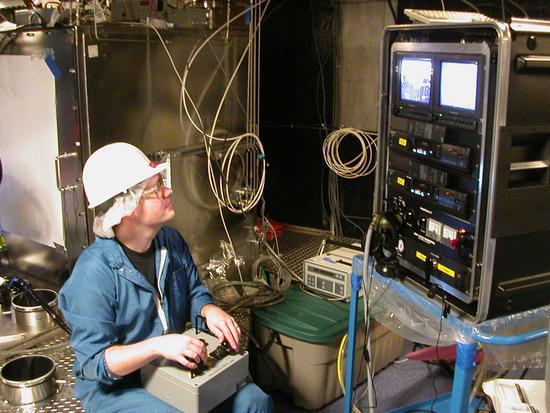 |
| Image courtesy SNOLAB |
Scientists at the Sudbury Neutrino Observatory (SNOLAB) and across Canada are delighted with the funding announcement which came from the Ontario Ministry of Research and Innovation on January 21st. This funding will continue to support revolutionary research taking place two kilometers underground at Vale INCO's Creighton Mine in Sudbury.
Ontario is investing $9,051,791 in the DEAP-3600 and the SNO+ experiment that are situated at SNOLAB. Dr. Mark Boulay and Dr. Mark Chen of Queen's University are the Principal Investigators in these dark matter experiments; this funding will ensure they have the tools and resources to continue groundbreaking research into understanding the origin of the Universe and how it continues to evolve.
"This provincial funding will allow us to take full advantage of the new SNOLAB facility by mounting two leading-edge experiments, with the potential of opening new windows on our universe. Dark matter particles have not yet been discovered, but are thought to account for most of the matter in our universe." said Dr. Boulay. "This new funding will allow us to increase experimental sensitivity to these particles by about 500 over existing experiments, possibly allowing us to detect them for the first time."
"We're thrilled with this new funding. It allows us to go forward with new experiments that address fundamental and important questions that will help our understanding of the evolution of the early universe." said Dr. Chen.
Minister of Research and Innovation John Milloy was on hand for today's announcement: "Our government is focused on creating jobs today and tomorrow - and providing support for innovative people and innovative thinking. We are demonstrating, once again, that our government understands the value of science to improving our lives and our economy." Milloy was joined by MPP for Sudbury Rick Bartolucci, "We're proud of the work that our researchers do and the wealth and jobs they create in Sudbury."
"These experiments will deliver world class research on a variety of cutting-edge physics questions, which will keep Canada at the forefront of the underground physics field." said SNOLAB Director Dr. Nigel Smith. "SNOLAB is delighted to be able to host these wonderful experiments in the underground laboratories."
TRIUMF has been a contributing partner to SNOLAB for some time. Several TRIUMF scientists lead key parts of the science program. During the construction phase of the facility, TRIUMF established an electronics test facility and commissioned some of the high voltage systems. TRIUMF also provided engineering and fabrication support for some of the major detector components. These activities were overseen by TRIUMF scientist Richard Helmer. David Sinclair, who is a joint TRIUMF scientist/ Carleton University faculty member, was the Associate Director (Science) and Deputy Director for the SNO project and is currently the Director of Facility Development for the lab. Both of the TRIUMF scientists were actively involved in the operation of the SNO detector and in physics analysis. Vance Strickland, a TRIUMF engineer working at Carleton University, has also been providing support for several of the SNOLAB experiments. Read more about TRIUMF's role with SNOLAB here.
About SNOLAB
The SNOLAB International Underground Science Facility is situated 2 km (6800 ft) underground in Vale-INCO's Creighton Mine near Sudbury, Ontario, Canada. The new facility was created by an expansion of the underground research areas next to the highly successful Sudbury Neutrino Observatory (SNO) experiment.
The entire laboratory is operated as an ultra-clean space to limit local radioactivity. With greater depth than any other international laboratory it has the lowest background from cosmic rays providing an ideal location for measurements of rare processes that would be otherwise unobservable. Measurements are planned by a number of international collaborations that will seek Dark Matter particles left from the Big Bang and search for a rare radioactive process called neutrino-less double beta decay that could help explain the development of matter in the early Universe. Other experiments will measure neutrinos from the Sun, the Earth, watch for Supernovae in our galaxy and measure local seismic activity.
The facility is operated by the SNO Institute with Canadian scientific participants from Laurentian University, Carleton University, Queen's University, University of Montreal, University of Guelph, University of Alberta, University of British Columbia and TRIUMF laboratory.
-- Press Release from Samantha Kuula, Science Education & Outreach Officer, SNOLAB, with additions by Melissa M. Baluk, Communications Assistant, TRIUMF
